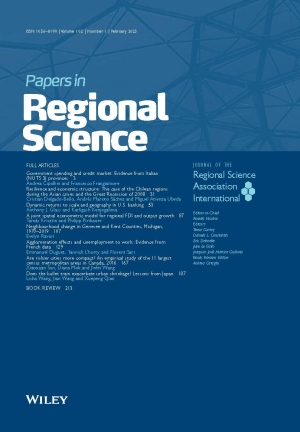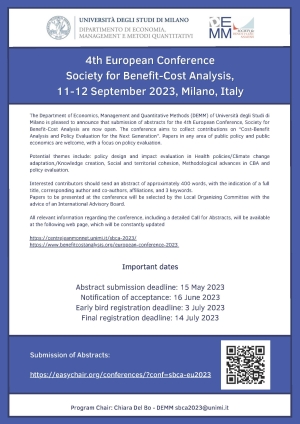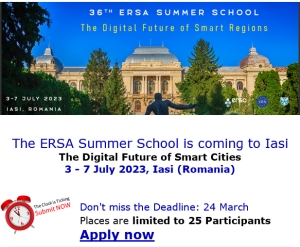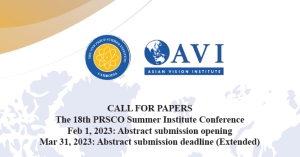Archives
Elisabete Martins
The Annals of Regional Science, Volume 70, Issue 2 - New Issue Alert
|
The latest issue of Papers in Regional Science are available! Volume 102, Issue 1, February 2023
ISSUE INFORMATION
FULL ARTICLES
Call for Abstracts | 4th European Conference Society for Benefit-Cost Analysis, 11-12 September 2023, Milano, Italy
The Department of Economics, Management and Quantitative Methods (DEMM) of Università degli Studi di Milano is pleased to announce that submission of abstracts for the 4th European Conference, Society for Benefit-Cost Analysis are now open. The conference aims to collect contributions on “Cost-Benefit Analysis and Policy Evaluation for the Next Generation”. Papers in any area of public policy and public economics are welcome, with a focus on policy evaluation.
Potential themes include: policy design and impact evaluation in Health policies/Climate change adaptation,/Knowledge creation, Social and territorial cohesion, Methodological advances in CBA and policy evaluation.
Interested contributors should send an abstract of approximately 400 words, with the indication of a full title, corresponding author and co-authors, affiliations, and 3 keywords.
Papers to be presented at the conference will be selected by the Local Organizing Committee with the advice of an International Advisory Board.
All relevant information regarding the conference, including a detailed Call for Abstracts, will be available at the following web page, which will be constantly updated
https://centrejeanmonnet.unimi.it/sbca-2023/
https://www.benefitcostanalysis.org/european-conference-2023
Important dates
Abstract submission deadline: 15 May 2023
Notification of acceptance: 16 June 2023
Early bird registration deadline: 3 July 2023
Final registration deadline: 14 July 2023
Submission of Abstracts: https://easychair.org/conferences/?conf=sbca-eu2023
Program Chair: Chiara Del Bo - DEMM This email address is being protected from spambots. You need JavaScript enabled to view it.
ERSA Summer School - Call for Application
|
|
|
|
|
|
|
|
|
|
|
PhD Scholarship: Regional resilience to economic shocks at Cities Research Institute at Griffith University
We are currently looking for a PhD candidate to conduct research into the ways that economic resilience can be measured at a spatial/ regional level with a focus on Australia. This program of research will extend from a larger project funded by an Australian Research Council Discovery Grant investigating the way Australian regions dealt with the economic and employment shocks associated with the COVID-19 pandemic. The successful applicant will work closely with Professor Scott Baum (Griffith) and Professor William Mitchell (University of Newcastle) to develop a program of research that will expand understanding of broader regional economic processes and exogenous and endogenous economic shocks. The project will provide a unique opportunity to be trained in a range of spatial and regional economic analytical techniques with the support of experienced supervisors.
please see details: https://www.griffith.edu.au/research-study/scholarships/regional-resilience-to-economics-shocks
Call for Papers | I International Conference on Public Policies and Data Science of Amazonas and II Conference on Data Science for Social Sciences, 19th to 24th June 2023 - Manaus and Itacoatiara, Amazonas, Brazil
Dear Colleagues
The Organising Committee of the I International Conference on Public Policies and Data Science of Amazonas and II Conference on Data Science for Social Sciences, which will take place between the 19th and 23rd of June this year, in the cities of Manaus and Itacoatiara, invites academics and researchers, professionals and technicians to submit their works on the themes of Regional Development/Public Policies and Data Science/Decision Support Systems. It is intended to stimulate the debate and exchange of experiences and ideas around the following questions:
- the role and challenges of public policy for the promotion of regional development
- the role and challenges of data science for the design and implementation of public policies and promotion of regional development
This is a joint initiative of the Federal University of Amazonas and the University of Aveiro (Portugal), which has the support of the Amazonas State Government (Brazil)
We share some information about the event:
Promotional video of the event; https://www.facebook.com/search/top?q=cippcdam
I CIPPCDAM website: https://eventos.galoa.com.br/cippcdam-2023/page/2354-inicio
Instagram: https://www.instagram.com/cippcdam/
Linkedin: http://linkedin.com/in/cippcd-am-984092266
Sincerely,
The organizing committee of the I CIPPCDAM
Hidelbrando Ferreira Rodrigues - Federal University of Amazonas
João Lourenço Marques - University of Aveiro
Call for Submissions: PRSCO Award for Best Paper by a Young Regional Scientist
Call for Submissions
PRSCO Award for Best Paper by a Young Regional Scientist
The Pacific Regional Science Conference Organization (PRSCO) offers a Best Paper Award annually. The Award is aimed at encouraging young regional scientists within the Asia-Pacific region to participate in research within the PRSCO community and to achieve research excellence. PRSCO now invites submissions for the 2023 Award.
The Award will be made for the best submission to the PRSCO Best Paper competition by a young regional scientist, under the age of 35 (on December 31, 2023), who is from a PRSCO-relevant part of the world.
The Award rules can be found on the PRSCO web site.
Papers submitted for the Best Paper Award should be presented to 18th the PRSCO summer institute in Cambodia on June 13-14, 2023.
Eligible authors who wish to submit a paper to the PRSCO Best Paper competition should email a pdf copy of their paper to the PRSCO Executive Secretary, Soushi Suzuki, This email address is being protected from spambots. You need JavaScript enabled to view it., by no later than Thursday, April 27, 2023.
Papers will be assessed by a PRSCO Best Paper Selection Committee and the author of the winning paper is expected to be notified by June 1, 2023. The decision of the Selection Committee will be final.
Submissions should include a cover page with the paper’s title, the author’s full name, affiliation, and contact details. Award applicants should either: state that the paper is single-authored; or provide the name of the co-author(s), together with evidence that the applicant is the lead author and has contributed over 70 per cent of the paper’s content. The applicant should also affirm that they meet the Award’s age criterion.
http://www.lst.hokkai-s-u.ac.jp/~soushi-s/prsco/PRSCOAwards.html
Winner 2023 - Martin Beckmann Annual Award for the best paper published in Papers in Regional Science in 2022

The Martin Beckmann RSAI Annual Award for the Best Paper in Papers in Regional Science
Winner 2023

 RSAI has the great pleasure to announce that the jury consisting of Budy Resosudarmo (PRSCO), William Strange (NARSC), Isabelle Thomas (ERSA) and Rosella Nicolini, EiC of the journal chose the article:
RSAI has the great pleasure to announce that the jury consisting of Budy Resosudarmo (PRSCO), William Strange (NARSC), Isabelle Thomas (ERSA) and Rosella Nicolini, EiC of the journal chose the article:
Jhorland Ayala-García and Sandy Dall'Erba (2022) The Impact of preemptive investments on Natural disasters, published in Papers in Regional Science, Volume 101, Issue 5, Pages 1087-1103.
Motivation:
This study delivers a very original contribution to the current and relevant debate on the role of institutions and public policies aiming at contrasting the socioeconomic impact of natural disasters on citizens’ life. The authors implement a precise research strategy approaching physical geography to regional science. They exploit novel and original data combining satellite information with public finance data for Colombian municipality and propose different indicators for approximating the market and non-market losses of landslide-related events (associated with extreme rainfalls events due to climate change). The empirical analysis relies on a robust IV approach building on a very attentive selection of covariates fitting the proposed indicators. The conclusion is a direct message to institutions and policy-makers demanding effective measures to protect lives and assets of the most vulnerable population.
as the winner of the Martin Beckmann Prize as the best paper published in Papers in Regional Science in 2022.
Extended: PRSCO 2023 Abstract submission deadline: March 31, 2023
Dear PRSCO councillors and friends,
I am so happy to inform you that the abstract submission deadline is extended by March 31, 2023, PRSCO 2023 at Angkor Paradise Hotel, Siem Reap, Cambodia, 13-14 June 2023, as attached file.
https://prscocambodia.org/abstract-submission-form/
I am looking forward to meeting you at Angkor Paradise Hotel in Cambodia.
Kind regards,
Soushi Suzuki
PRSCO Executive Secretary
Hokkai-Gakuen University
Call for Papers and Special Session Proposals | 30th APDR Congress, July 19-21, 2023, University of Minho, Braga, Portugal
Call for Papers and Special Session Proposals
The APDR invites regional scientists, economists, sociologists, geographers, urban planners, policy makers, and researchers of related disciplines to participate in the 30th APDR Congress with the theme "Sustainability Development Challenges of Territories in Contexts of Uncertainties due to External Shocks and Risks" that will be held from 19th to 21st of July, 2023, at University of Minho (Institute of Social Sciences and Lab2PT), Campus de Gualtar, Braga, Portugal.
During the last years, the COVID-19 pandemic and, more recently, the war in Ukraine, following the decision of Russia to invade it, impacted deeply world economy and citizens daily life, particularly in some territories more exposed to the tourism industry or relying more on non-renewable energies and other production factors which the war turned scarcer or more expensive. No one knows yet when this international conflict can have an end. Besides, the international trade chain goes on suffering from the impacts of the pandemic, a phenomenon that is still without enough control in China. The need to enhancing the fight against global warming and climate change, as well as the continuous evolution of digital technologies, are also bringing some uncertainty to the markets, and it is hard to predict whose territories will be the winning and looser ones.
In this context, adopting more sustainable development strategies, social inclusive policies, more environmental friendly transport modes, commit more on innovation and entrepreneurship at regional and local levels, and adopting new governance models at the territories, aiming deepen democracy and give efficacy to the decision making process on the main issues affecting territories development, looks to be required.
The overall aim of this conference is to bring ideas, theoretical approaches and examples of potential solutions to territorial bottlenecks and social and development difficulties.
The call for papers and Special Session Proposals are open and your participation is very welcome!
Regular Sessions:
RS15 - Inequalities, Asymmetries and Socio-Territorial Cohesion
RS16 - Risk and Disaster Management: Vulnerability and Resilience in Adverse Contexts
RS17 - Active and Inclusive Mobility
RS18 - Effects of Multiple External Risks/Shocks on Islands
RS19 - Demographic Challenges, Migrations and Integration
RS20 - Natural Environment and Territories Development
RS21 - Energy Transition and Regional Development Policies
RS22 - Infrastructure, Housing and Inclusive Growth
RS23 - Networks and Cooperation and Territories Development
RS24 - Regionalization and Decentralization: the Necessary Reform of State Aiming at Deepening Democracy and Enhancing Territories Development
RS25 – Entrepreneurial and Sustainable Ecosystems
RS26 – Circular Economy in Regions and Cities
Deadline for Special Session proposals: April 15, 2023. Proposals should be sent by email to the secretariat of the Congress (This email address is being protected from spambots. You need JavaScript enabled to view it.).
Deadline for Abstracts submissions: May 15, 2023. Authors should submit their abstracts through online submission system by following the link https://cmt3.research.microsoft.com/APDR2023.
All information at the congress website: http://www.apdr.pt/congresso/2023 Looking forward to meeting you in Braga, Portugal!
The Organizing Committee and the Board of APDR 30th APDR Congress
About Us
The Regional Science Association International (RSAI), founded in 1954, is an international community of scholars interested in the regional impacts of national or global processes of economic and social change.

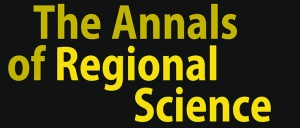

 The Annals of Regional Science.
The Annals of Regional Science. 